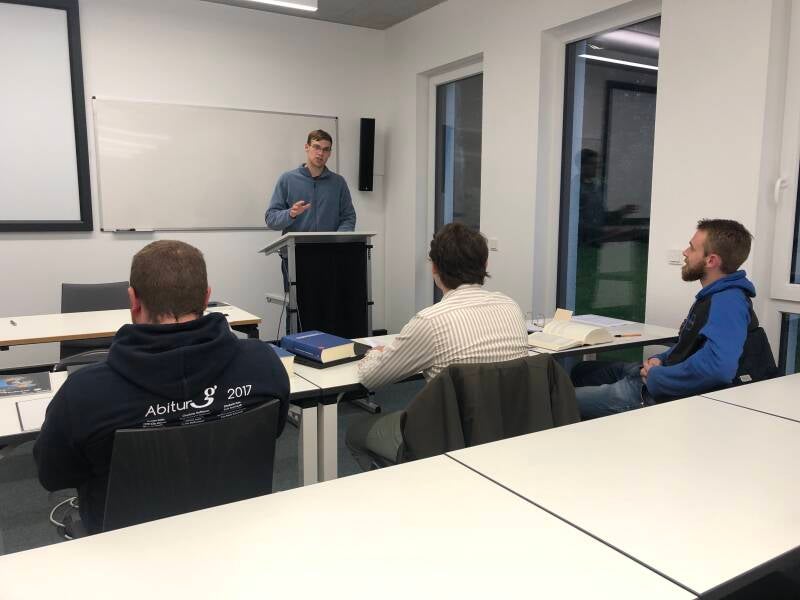End of Winter Semester:
Today marked the end of the winter semester at the Lutherische Theologische Hochschule (LtTH). If you are wondering why the first week of February is the end of the winter semester, the German education system has some differences from the American system. For starters, like most American universities, the German universities and Hochschulen—which are institutions of higher education, despite the literal translation of “high school,” and the term can also refer to universities—have two semesters per academic year. However, instead of fall and spring semesters that span September through December and January through May, most German Universitäten/Hochschulen have a winter semester from October through March and a summer semester from April through September. The second big difference is the structure of the classes. The German schools have a variety of classes: Vorlesung, Übung, Proseminar, and Hauptseminar. Some institutions might have additional courses, but these are the types of classes offered at LtTH. The Vorlesungen are formal lectures. These are most similar to 100-level classes at American universities, where the professor delivers a formal lecture with little to no interaction with the students and the outside coursework is minimal. The Übungen and Proseminars would compare to the 200-level and 300-level courses in America, where the class sizes are smaller, more work is required, and there is more interaction between the students and professors. The Hauptseminars are most alike to 400-level courses, where the topics of the classes are narrow and the workload is significantly larger. Furthermore, the Proseminars and Hauptseminars typically require larger papers at the end of those courses, but the students submit those papers at the actual end of the semester. So for example, even though the winter semester courses at LtTH ended today, many students have papers they must submit in February and March.
This first semester at LtTH was a very enriching semester, which improved my German, further developed my theology, and deepened my knowledge of Holy Scripture. I took the Vorlesung on the Gospel of John, the Übung for Latin I, the Übung on the Apology to the Augsburg Confession, and the Übung on the books of the prophets. In the Vorlesung on the Gospel of John, we translated from the Greek text into German, and the professor delivered a verse-by-verse commentary and unpacked the tremendous theology and Christology in my favorite book of the Bible. I decided to take Latin because I enjoy learning new languages and because I thought it would improve my German, and the class was both very enjoyable and extremely beneficial. The class met four days each week, learning the grammar and vocabulary of Latin and working on translations. Learning another language in German and translating the Latin into German has helped increase my knowledge and competency in German beyond measure! Even though I had already taken the class which covered the Apology of the Augsburg Confession at Concordia Theological Seminary, Fort Wayne, I wanted to take the Übung on the Apology to better my understanding of Philip Melanchthon’s magnum opus and one of the most important documents in Lutheran theology. Naturally, when you study the Apology, you have to reflect on the Augsburg Confession and analyze The Confutation from the Roman Catholics against the Augsburg Confession, so during this class my knowledge and understanding of both the Augsburg Confession and the Apology increased and solidified. The professor also had us read some of the decrees of the Council of Trent, which is the formal Roman Catholic response to the Protestant Reformation, and thus I gained a better understanding of the doctrinal views of the Roman Catholic church. Also during this Übung, each student had to give three presentations (which was a good exercise in my German), and there was also much open dialogue to discuss the Apology and its implications on our theology and doctrine in the Lutheran church. Lastly the Übung on the prophetic books met once a week on Friday mornings. During the week, we were to read the assigned prophetic book(s) for the week from a German Bible and answer questions that the professor posted. Then during the class, the professor would discuss the history and context of the prophets, and the students would read select passages from the Scriptures and discuss the texts, and we would review the questions assigned for the week. This class was a great opportunity to study all of the prophets and obtain a solid understanding of the prophetic books, their history, their themes, and their ultimate anticipation of the coming of Christ. And I passed the exam at the end!
In addition to the classes, the students and professors have daily chapel (Andacht) at St. John’s Church next to the Hochschule campus, and between the classes, chapel, the Winter Convention of the SELK Students, and daily conversations with the students and professors, I have learned much and gained new insights.
Overall, this was a fantastic first semester in Germany. Being immersed in the Word of God is a wonderful thing, and experiencing that in another language and in another country is truly a joy. When I studied German at the University of Alabama, I did not participate in any study abroad programs, and after graduation, I thought that the chance to go to Germany would only be a slim chance through the Marine Corps. And now I am living in Germany for a year with my amazing family, studying and growing to become a pastor! I am beyond grateful for this opportunity, and I truly thank all the people who have helped us get here through their prayers, love, and support. And above all, I give glory to God whose providential hand worked through all these people and guided us here.
Soli Deo gloria!
~Eric
Proverbs 16:9



Add comment
Comments